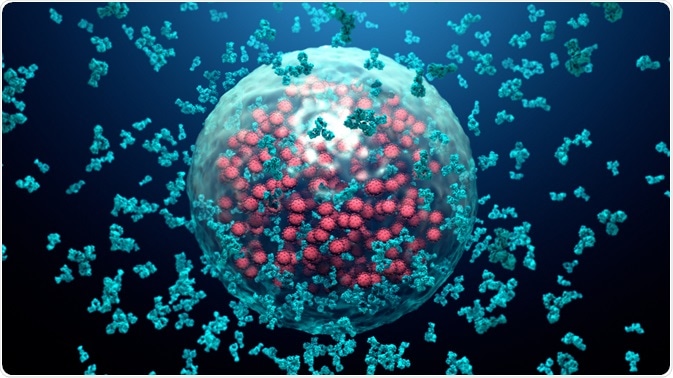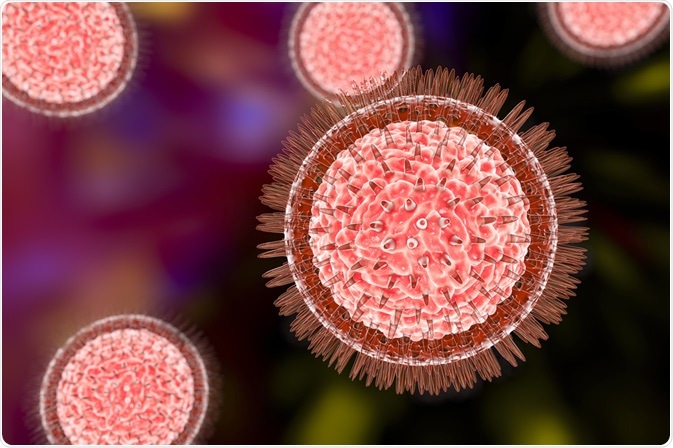What are Neutralizing Antibodies? - News-Medical.net
A neutralizing antibody (NAb) is an antibody that is responsible for defending cells from pathogens, which are organisms that cause disease. They are produced naturally by the body as part of its immune response, and their production is triggered by both infections and vaccinations against infections.

Neutralizing antibodies can result in lifelong immunity to certain infections and can be used to see if a person has developed immunity to an infection after they have recovered from it.
Neutralizing antibodies can be confused with binding antibodies, which are responsible for binding to a pathogen and alerting the immune system to its presence so white blood cells can be sent to destroy it. Neutralizing antibodies, although an integral part of the body's immune response, serve a different purpose to binding antibodies.
How are neutralizing antibodies made?
Antibodies are made by B-cells in the bone marrow. When B-cells are created, they begin to produce antibodies that will bind to specific antigens.
How neutralizing antibodies work
A neutralizing antibody can stop a pathogen from infecting the body by affecting how the molecules on the pathogen's surface can enter cells in the body.
In enveloped viruses (a heat-sensitive virus cell that is inside a lipid membrane), neutralizing antibodies block the attachment of a virus to the cell as well as its entry into the cell.
In non-enveloped viruses (a heat-resistant virus-cell with no lipid membrane), neutralizing antibodies can bind to the capsid protein, which is the protein shell that surrounds the genetic information within a virus cell.
Neutralizing antibodies can also stop pathogens from changing their structure and shape, known as conformational changes, in order to enter and replicate within a cell.
In bacterial infections, neutralizing antibodies can block the harmful effects of toxins. This has been shown to happen in diphtheria medications, although they are no longer recommended to prevent diphtheria infections.
Once a pathogen has been neutralized by a NAb, the pathogen is degraded by white blood cells, and the spleen filters the pathogen for it to then be excreted through urine or feces.
Applications for neutralizing antibodies
A common use for neutralizing antibodies in medicine is in passive immunization. This is the process in which a person who is not immune to disease is given antibodies from a person who is already immune to the disease.
This protection does not last long, but it does protect and fight against infection immediately. Passive immunity can be passed on naturally through breastfeeding for the first few months of a baby's life.
Vaccination also makes use of neutralizing antibodies, which is known as active immunization. Vaccines are designed to mimic a natural immune response to an infection by injecting an active specimen of a virus or bacteria or part of a virus or bacteria into the body.
The immune system can be triggered to produce neutralizing antibodies in response to the virus or bacteria in the vaccine, which will then recognize and fight the infection naturally if the person is exposed to the pathogen for a second time.
How viruses evade neutralizing antibodies
Some viruses can evade the effects of neutralizing antibodies, such as the dengue virus and the Zika virus. The influenza virus is also able to evade neutralizing antibodies because it regularly mutates so that it is no longer recognized by antibodies, even though these antibodies may have recognized a previous strain of the influenza virus.
A process known as antibody-dependent enhancement (ADE), which leads to more severe infections, can take place when a virus binds to antibodies that help the virus infect cells. The virus is better able to enter into cells in the body and is sometimes more able to replicate once it has entered a host cell.
There are several ways by which antibody-dependent enhancement could take place.
In Dengue virus, neutralizing antibodies have been found to bind to a type of white blood cell known as a macrophage that helps the virus enter those white blood cells and replicate.
Additionally, proteins on the surface of a virus can be covered with antibodies that fight one serotype of a virus and can bind to a separate, similar virus with a different serotype.
The combination of the virus and antibodies then bind to the Fc-region antibody receptors (proteins that play a part in the protective role of the immune system) found on the cell membrane.
As a result, the cell is then able to internalize the virus and go on to replicate it, leading to enhanced infection.
Antibody-dependent enhancement has been seen in the following viruses:
- Dengue virus
- Yellow fever virus
- Zika virus
- Human immunodeficiency virus (HIV)
- Coronaviruses affecting both humans and animals
ADE is a cause for concern in the development of vaccines. This is because vaccines often trigger the production of antibodies that could then facilitate ADE and cause more severe illness.
For instance, vaccinations against Dengue virus and a coronavirus affecting cats were deemed unsuccessful because they resulted in antibody-dependent enhancement that made the infection worse in those that had been vaccinated when compared to those that had not been vaccinated.

Image Credit: Kateryna Kon/Shutterstock.com
Summary
Neutralizing antibodies are naturally occurring antibodies that play an important role in the immune system. They work alongside binding antibodies that signal the presence of a pathogen in the body so that white blood cells can locate and kill it.
Neutralizing antibodies are responsible for blocking the entry of a pathogen into a cell so that it is firstly unable to infect healthy cells, and secondly, it is unable to replicate and cause severe infection.
Neutralizing antibodies have found application in medicine and are often used as part of vaccines, but they have been found to help viruses enter cells and replicate to cause severe infections, and as such ensuring that neutralizing antibodies will not facilitate infection is an important part of developing vaccines.
References
- An, Z., et al. Antibody therapies for the prevention and treatment of viral infections. (2017). https://www.ncbi.nlm.nih.gov/pmc/articles/PMC5627241/
- Bhattacharya, J., Ringe, R. Preventative, and therapeutic applications of neutralizing antibodies to human immunodeficiency virus type 1 (HIV-1). (2013). https://www.ncbi.nlm.nih.gov/pmc/articles/PMC3967664/
- Feldmann, H., et al. Antibody-dependent enhancement of Ebola virus infection. (2003). https://jvi.asm.org/content/77/13/7539
- Forthal, D. N. Functions of antibodies. (2014). https://www.ncbi.nlm.nih.gov/pmc/articles/PMC4159104/
- History of Vaccines. (2018). https://www.historyofvaccines.org/content/articles/passive-immunization
- Klasse, P. J. Neutralization of virus infectivity by antibodies: old problems in new perspectives. (2014). https://www.hindawi.com/journals/ab/2014/157895/
- PNAS. (2020). https://www.pnas.org/content/117/15/8218
- Virology. (2009). https://www.virology.ws/2009/07/24/virus-neutralization-by-antibodies/
Comments
Post a Comment